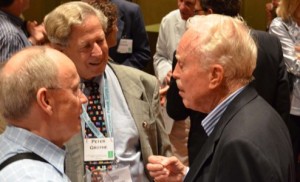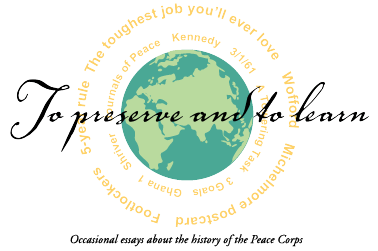The Writer Who Named the “Peace Corps”
THOSE OF US WHO follow the history of the Peace Corps agency know the term “peace corps” came to public attention during the 1960 presidential election. In JFK’s last major speeches before the November election at the Cow Palace in Daly City, California he called for the creation of a “Peace Corps” to send volunteers to work at the grass roots level in the developing world.
However, the question remains: who said (and wrote) “peace corps” for the very first time? Was it Kennedy? Was it his famous speech writer Ted Sorensen? Or Sarge himself? But — as in most situations — the famous term came about because of some young kid, usually a writer, working quietly away in a back office that dreams up the language. In this case the kid was a graduate student between degrees who was working for the late senator Hubert Horatio Humphrey.
Today, fifty-eight plus years after the establishment of the agency in March of 1961, it is generally acknowledged that Peter Grothe authored the term in the spring of 1960. I learned about the history of the naming from Peter when we exchanged a series of emails back in 2006.
“There would have been no Peace Corps without John F. Kennedy being elected President,” Peter wrote me on April 19, 2006. The term “peace corps” came about when Peter, then Senator Humphrey’s Foreign Relations Advisor, drafted a bill in May of 1960 and used the words “peace corps.” This was on the eve of the U-2 incident and the West Virginia primary which Kennedy won, a victory that showed a Catholic could win in a traditional protestant state, and, therefore, could win a general election.
“I gave the name “Peace Corps,” [in this draft of a Humphrey sponsored foreign assistance bill] in order to be consistent with the Senator’s Peace theme,” Peter explained. [Humphrey was also proposing an “education for peace” bill]. “I first, toying round, gave it the name “Works for Peace Corps,” but that seemed too cumbersome,” Peter remembers, “so I just shortened it to “Peace Corps” and Senator Humphrey approved. Some said that it sounded ‘communistic.’ Other said that it sounded too militaristic (corps). But somehow it stuck!”

Neil Boyer (Ethiopia 1962-64); Peter Grothe and Jack Hood Vaughn, Second Peace Corps Director, at the Staff Reunion September 2011
Peter also added this important — and missing — piece of information about his involvement with the “peace corps” idea. “When I left Humphrey to go back to do my Ph.D. work, I asked him if I could take the idea to Kennedy, who, by that time, had won the Democratic nomination. Humphrey said, ‘of course!’ I drafted a speech I hoped JFK would use in the campaign and took it to the head of Kennedy’s speech writers in the campaign, Archibald Cox.
“I told Cox we had received an enormous amount of mail, many of it from Protestant groups, because the Peace Corps reminded them of action-oriented, Protestant missionary work. Cox listened to this because, as you know, no Catholic had ever been elected to the presidency.
“I returned to Stanford and was in the Cow Palace in San Francisco the night Kennedy chose to give the Peace Corps speech I had written. There were some changes, but about 75% of his speech was what I had written. The major change was that the Humphrey bill had the Peace Corps as an alternative to the draft, and Kennedy removed that provision (good politics!). I sat there in disbelief of Kennedy’s giving MY speech and I said to myself, “if the Lord wants to take me right now, Lord, I am ready to go.”
Well, the Lord didn’t take Peter Grothe that night.
After the Peace Corps, Peter had a long and distinguished career as an academic. For 31 years he was an Adjunct Professor at the Graduate School of International Policy Studies, Monterey Institute of International Studies (MIIS). He taught Cross-cultural Communications and American Politics and was the Director of International Student Programs. Prior to coming to MIIS he was at San Jose State University, Odense University in Denmark, and State University of New York, Stony Brook. He was a Visiting Research Scholar in Sweden and Norway and he lectured in over 51 countries, 26 of those for the U.S. Information Agency.
Grothe was the author of To Win the Minds of Men — a Study of the Propaganda War in East Germany and wrote numerous scholarly articles in the American Political Science Review, Western Political Quarterly, New York Times, Washington Post, Christian Science Monitor, and San Francisco Chronicle. He served with the American Field Service as an adviser, leader and volunteer.
John Peter Grothe died on Saturday, June 16, 2012 in Los Altos, California from brain injury caused by a fall. He was 81.

Very interesting and nice to know. Thank you again. You’re the best John!
I have been saying for decades that our species desparately needs global peace education. A cursory look at the loss of life, liberty, nature, productivity, and treasure caused by war should be “enough said” on the matter. The US military budget is 1000s of times its Peace Corps budget. This year Trump raised the Pentagon budget by an amount equal to 225 times the entire Peace Corps budget. What do we expect…peace?
In line with Peter Grothe’s career, I have always coupled with these ideas two related provisions: 1. Universal (anti-propaganda) Psychology Education for Democracy and 2. Universal accountability laws requiring public servants to pass a course in ethics BEFORE filing for any public election with acknowledgement that bullshit PR campaign promises (generally unsupported by facts) which the candidate never attempts in good faith to impliment (Trump’s Wall) are grounds for immediate removal from office. For the survival of our species we simply cannot accept the notion “all politicians lie.”
Perhaps when an outright lie is told in a campaign, we need a “fact-checking election ombudsman” of sorts to quickly CORRECT and warn the candidate to refrain from further lying or face immediate disqualification from the race. If a competitor in the Olympics committed a false start, they would face an immediate DQ–so why not asshole politicians selling snake oil???
In summary:
1- Peace Education
2-Anti-Propaganda Education (think Howard Zinn’s History book)
3-Accountability laws with teeth for all public servants.
If we spent 2000 time the Peace Corps budget on this our species might have a fighting chance at surviving until the sun burns out.
Very interesting commentary. However, I have a different opinion on this statement: “Perhaps when an outright lie is told in a campaign, we need a “fact-checking election ombudsman” of sorts to quickly CORRECT.” That is precisely the responsibility of the press and the opposing political party.
Thanks for reminding as a Berkeley girl of all the historical events that took place at the Cow palace! And none greater than this Kennedy speech! Wish I had been in the audience.
Often thought that in addition to having a war department we should have a peace department. Of equal importance in Washington.
Is the original Kennedy spech avaiiable on video somewhere ? John Turnbujll